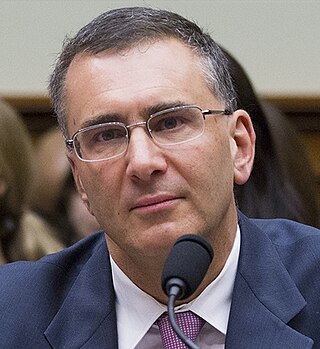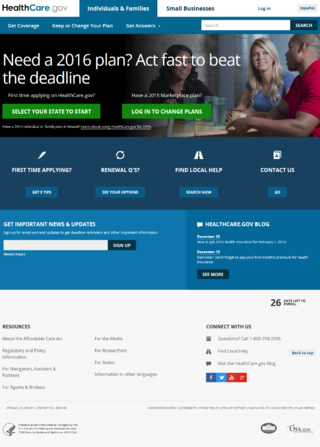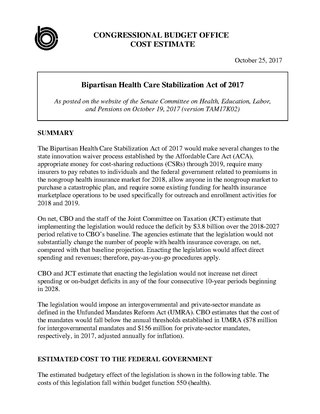
Patrick Joseph Tiberi is an American lobbyist and politician who served as the U.S. representative for Ohio's 12th congressional district from 2001 to 2018. His district included communities north and east of Columbus. He is a member of the Republican Party, and previously served in the Ohio House of Representatives from 1993 to 2000. He briefly served as Chair of the new Republican Main Street Congressional Caucus from September 7, 2017.

Jonathan Holmes Gruber is an American professor of economics at the Massachusetts Institute of Technology, where he has taught since 1992. He is also the director of the Health Care Program at the National Bureau of Economic Research, where he is a research associate. An associate editor of both the Journal of Public Economics and the Journal of Health Economics, Gruber has been heavily involved in crafting public health policy.
In the United States, health insurance marketplaces, also called health exchanges, are organizations in each state through which people can purchase health insurance. People can purchase health insurance that complies with the Patient Protection and Affordable Care Act at ACA health exchanges, where they can choose from a range of government-regulated and standardized health care plans offered by the insurers participating in the exchange.
A health insurance mandate is either an employer or individual mandate to obtain private health insurance instead of a national health insurance plan.

The Affordable Care Act (ACA), formally known as the Patient Protection and Affordable Care Act (PPACA) and colloquially known as Obamacare, is a landmark U.S. federal statute enacted by the 111th United States Congress and signed into law by President Barack Obama on March 23, 2010. Together with the Health Care and Education Reconciliation Act of 2010 amendment, it represents the U.S. healthcare system's most significant regulatory overhaul and expansion of coverage since the enactment of Medicare and Medicaid in 1965.

The Authority for Mandate Delay Act is a bill that would amend the Patient Protection and Affordable Care Act "to delay until 2015 enforcement of requirements that large employers offer their full-time employees the opportunity to enroll in minimum essential coverage." The bill was introduced into the United States House of Representatives during the 113th United States Congress.

The Fairness for American Families Act is a bill that would "amend the Internal Revenue Code, as amended by the Patient Protection and Affordable Care Act, to delay until 2015 the requirement that individuals maintain minimal essential health care coverage." The bill was introduced into the United States House of Representatives during the 113th United States Congress.
The Affordable Care Act (ACA) is divided into 10 titles and contains provisions that became effective immediately, 90 days after enactment, and six months after enactment, as well as provisions phased in through to 2020. Below are some of the key provisions of the ACA. For simplicity, the amendments in the Health Care and Education Reconciliation Act of 2010 are integrated into this timeline.

HealthCare.gov is a health insurance exchange website operated by the United States federal government under the provisions of the Affordable Care Act or ACA, commonly referred to as “Obamacare”, which currently serves the residents of the U.S. states which have opted not to create their own state exchanges. The exchange facilitates the sale of private health insurance plans to residents of the United States and offers subsidies to those who earn between one and four times the federal poverty line, but not to those earning less than the federal poverty line. The website also assists those persons who are eligible to sign up for Medicaid, and has a separate marketplace for small businesses.

The Keep Your Health Plan Act of 2013 is a bill that would permit insurance companies forced to cancel existing insurance plans that do not meet Affordable Care Act rules to continue offering those plans during 2014. The bill is intended to "make good on President Obama's promise that 'if you like your health plan, you can keep it.'"

The Exchange Information Disclosure Act is a bill that would require the United States Department of Health and Human Services to submit weekly reports to Congress about how many people are using HealthCare.gov and signing up for health insurance. These reports would be due every Monday until March 31, 2015, and would be available to the public. The bill would "require weekly updates on the number of unique website visitors, new accounts, and new enrollments in a qualified health plan, as well as the level of coverage," separating the data by state. The bill would also require reports on efforts to fix the broken portions of the website.
The following is a list of efforts to repeal the Affordable Care Act, which had been enacted by the 111th United States Congress on March 23, 2010.

The following is a list of plans which were considered to replace the Affordable Care Act during the Donald Trump administration. The plans were considered after the Republican Party gained a federal government trifecta in 2016. "Repeal and replace" has been a Republican slogan since March 2010 when the ACA was signed into law and had been adopted by former President Donald Trump.

The American Health Care Act of 2017 was a bill in the 115th United States Congress. The bill, which was passed by the United States House of Representatives but not by the United States Senate, would have partially repealed the Affordable Care Act (ACA).
The "Jimmy Kimmel test" is a political litmus test used in political discourse in the United States during 2017 efforts to repeal the Affordable Care Act. First proposed by United States Senator Bill Cassidy, the test was used throughout 2017 to frame political debate over health care reform, and Cassidy's use of it in September 2017 prompted comedian and late-night talk show host Jimmy Kimmel to publicly attack a Senate health care bill co-sponsored by Cassidy. The resulting public debate contributed to the failure of the Senate bill.

The Executive Order Promoting Healthcare Choice and Competition, also known as the Trumpcare Executive Order, or Trumpcare, is an Executive Order signed by Donald Trump on October 12, 2017, which directs federal agencies to modify how the Patient Protection and Affordable Care Act of the Obama Administration is implemented. The order included a directive to federal agencies to end rules forbidding employers from using health reimbursement arrangements (HRAs) to pay individual insurance premiums.

The Bipartisan Health Care Stabilization Act of 2017 was a 2017 proposed compromise reached by senator and HELP Committee chairman Lamar Alexander and senator and HELP Committee ranking member Patty Murray to amend the Affordable Care Act to fund cost-sharing reductions subsidies. The plan will also provide more flexibility for state waivers, allow a new "Copper Plan" or catastrophic coverage for those under 30, allow interstate insurance compacts, and redirect consumer fees to states for outreach. President Trump had stopped paying the cost sharing subsidies and the Congressional Budget Office estimated his action would cost $200 billion, cause insurance sold on the exchange to cost 20% more and cause one million people to lose insurance.

"Waterloo" is a post conservative American commentator David Frum made to his blog, FrumForum, on March 21, 2010. Earlier in the day the United States House of Representatives had passed the Patient Protection and Affordable Care Act (ACA), clearing the way for President Barack Obama to sign the sweeping health care reform into law. Frum took his title from an earlier prediction by South Carolina Senator James DeMint that the ACA would be a "Waterloo" for Obama and his presidency if Republicans could prevent its passage, much as they had done with Bill Clinton's similar efforts in 1993, which purportedly contributed to the Republicans taking majorities in both houses of Congress in 1994.
The Patient Protection and Affordable Care Act, often shortened to the Affordable Care Act (ACA) or nicknamed Obamacare, is a United States federal statute enacted by the 111th United States Congress and signed into law by President Barack Obama on March 23, 2010. Together with the Health Care and Education Reconciliation Act of 2010 amendment, it represents the U.S. healthcare system's most significant regulatory overhaul and expansion of coverage since the passage of Medicare and Medicaid in 1965. Once the law was signed, provisions began taking effect, in a process that continued for years. Some provisions never took effect, while others were deferred for various periods.
California v. Texas, 593 U.S. ___ (2021), was a United States Supreme Court case that dealt with the constitutionality of the 2010 Affordable Care Act (ACA), colloquially known as Obamacare. It was the third such challenge to the ACA seen by the Supreme Court since its enactment. The case in California followed after the enactment of the Tax Cuts and Jobs Act of 2017 and the change to the tax penalty amount for Americans without required insurance that reduced the "individual mandate" to zero, effective for months after December 31, 2018. The District Court of the Northern District of Texas concluded that this individual mandate was a critical provision of the ACA and that, with a penalty amount equal to zero, some or all of the ACA was potentially unconstitutional as an improper use of Congress's taxation powers.








